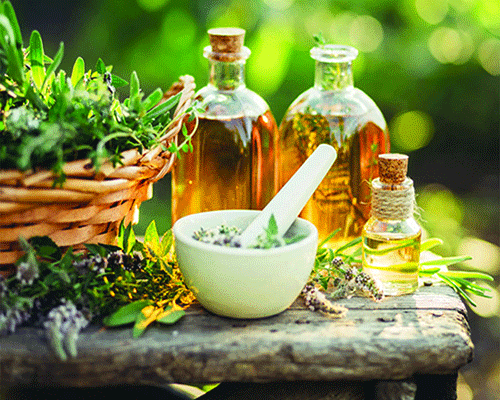Maria Haipinge
Natural medicine should be seen as a primary healthcare service people should first opt for before they use different types of treatment modalities to heal them.
This is the view of Dr Penehafo Haitamba-Shindume, a local naturopath, practising at her Happy Health consultancy, from where she prescribes natural healing and wellness procedures and provides medicine and supplements to help the body heal itself.
Haitamba-Shindume defines naturopathy as a discipline of medicine that utilises alternative therapies like nutrition, nutritional supplements, herbal medicine and other alternative therapies, including hydrotherapy.
“It is those types of interventions that we apply from a medicinal point of view to address states of conditions or chronic conditions like diabetes, high blood pressure and so on,” she explained.
“So, it’s for people who are having conditions that they have to live with on a daily basis.”
Naturopathy may guide them on a lifestyle with that particular condition if they have it, alleviate that particular condition or prevent that particular condition.
The discipline focuses on preventing and treating chronic lifestyle conditions, using methods of nutrition.
“In those cases, one would be guided nutritionally on what to take regularly, and what to eat regularly. If you don’t have access to the foods that you need for that condition to be treated, then you are given nutritional supplements and herbal medicines,” explained Haitamba-Shindume.
With the notion that naturopathy is a natural method, it is at times confused with the use of traditional methods/medicine.
Haitamba-Shindume clarified that naturopathy is not traditional medicine but science that originated in Europe, and it is also practised widely in Asia, Australia, Canada and America.
She said it is not the way local people practise traditional medicine: naturopathy consists of products that are well studied and well-sourced, such as vitamins, minerals and other substances already supplied by most pharmacies.
What qualifies her to treat people through naturopathy is the training she received to utilise those products and give nutritional advice around conditions.
DNA Testing
In detail, Haitamba-Shindume also offers DNA testing through which she understands a client’s DNA composition, based on their nutritional demands.
She explained: “Your genetics give you the base of how your body is supposed to be or work, and its environment allows for these genetic traits to be expressed”.
This means the types of foods people eat affect how their genes express themselves.
“You can avoid developing diabetes if you know you have that weakling – in the first place – and then figuring out what types of foods to eat or focus on so that it never gets expressed. It is an opportunity yet again.”
Passionate about nutrition, she further pointed out that from several tests done on her patients, she picked up a specific trend that “us, black people, are not meant to eat certain foods”.
“We were introduced to foods that are very processed or that are rich in carbohydrates and sugar. But back then – 30 years ago – sugar was not highly consumed the way we do now – even alcohol.”
She said this finding, in itself, is an opportunity to understand and promote health awareness campaigns on why certain foods may not necessarily be great for black people or how to mitigate these conditions.
“And because we’re black, we are prone to developing certain illnesses more than other races – but then, other races also have their issues to deal with.”
Haitamba-Shindume is positive such tests will lower the incident rates on these types of conditions – and that will, in turn, help the health systems in the country.
She raised the concern that many people, Namibians specifically, do not value their traditional food because they do not know it is healthy.
Moreover, people opt for affordable snacks or food items such as a packet of chips or processed white bread, instead of, for instance, baking their bread, “such as omungome (mahangu bread); it is way healthier and fibrous compared to white bread.”
One of Haitamba-Shindume’s patients since 2016 Carol Millward said naturopathy changed her outlook on health completely.
She started naturopathy to “free” her body from chemical medicine and add essential nutrients, such as minerals and vitamins, to her everyday health routine.
“An Es Teck scan on my body showed up health issues that required attention and maintenance – and certainly disciplined me to take care of my health in a holistic way. The minerals prescribed and taken daily improved my condition substantially.”
“My vitality has improved significantly. My health profile has shown improvement – some issues more readily than others. I have significantly, through the doctor’s advice, been successful in removing harmful toxins from my system. Of course, all of this regimen needs a regular intake of water and some form of exercise, since being sedentary is harmful in any form or way to the mind, body and soul.”
Awareness
Awareness of naturopathy is still really low in the country.
“There are currently only two naturopaths I know of in the practising. It’s been a 10-year journey of trying to make people aware of this profession; yet, I realised with my experience and background, that it’s still a very foreign concept.”
Currently, there are no courses in naturopathy training in Namibia, she said, adding that even the practice of nutrition is not considered a profession.
“We don’t have many black nutritionists in the country, so you can already tell that the gap in knowledge around these types of professions is really big in the country.”
Haitamba-Shindume, who obtained her BSC in Complementary Health Sciences – Naturopathy at the University of Western Cape, was introduced to the career by a friend, who worked as a receptionist for a naturopathic doctor.
As an African in the field, she wants to highlight African ways of medicine in naturopathy.
“So, it’s underrepresented but there is an opportunity to bring traditional medicine – the way we see it – into mainstream medicine through naturopathy.”
– emariahaipinge@gmail.com


